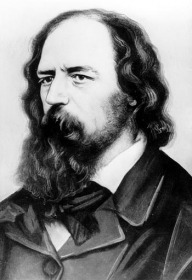Narrative Poem
a non-dramatic poem which tells a story or presents a narrative, whether simple or complex, long or short. Epics and ballads are examples of narrative poems.
The Charge of the Light Brigade
Alfred Lord Tennyson
Half a league, half a league,
Half a league onward,
All in the valley of Death
Rode the six hundred.
“Forward, the Light Brigade!
Charge for the guns!” he said:
Into the valley of Death
Rode the six hundred.
“Forward, the Light Brigade!”
Was there a man dismayed?
Not tho’ the soldiers knew
Someone had blundered:
Theirs was not to make reply,
Theirs was not to reason why,
Theirs was but to do and die:
Into the valley of Death
Rode the six hundred.
Cannon to the right of them,
Cannon to the left of them,
Cannon in front of them
Volleyed and thunder’d;
Storm’d at with shot and shell,
Boldly they rode and well,
Into the jaws of Death,
Into the mouth of Hell,
Rode the six hundred.
Flashed all their sabres bare,
Flashed as they turned in air,
Sab’ring the gunners there,
Charging and army, while
All the world wondered:
Plunging in the battery smoke,
Right through the line they broke;
Cossack and Russian
Reeled from the sabre-stroke
Shattered and sundered.
Then they rode back, but not—
Not the six hundred.
Cannon to the right of them,
Cannon to the left of them,
Cannon in front of them
Volleyed and thundered;
Stormed at with shot and shell,
While horse and hero fell,
They that fought so well,
Came thro’ the jaws of Death,
Back from the mouth of Hell,
All that was left of them,
Left of the six hundred.
When can their glory fade?
Oh, the wild charge they made!
All the world wondered.
Honor the charge they made!
Honor the Light Brigade,
Noble Six Hundred!
Alfred Lord Tennyson wrote his poem “The Charge of the Light Brigade” about the disastrous cavalry charge led by Lord Cardigan during the Battle of Balaclava on October 25, 1854. His lines have made the charge a symbol of warfare at both its most courageous and its most tragic. Each stanza tells a different part of the story, and there is a delicate balance between nobility and brutality throughout. Although Tennyson’s subject is the nobleness of supporting one’s country, it pulls not punches about the horror of war. This poem is considered a narrative poem because it tells the story of the cavalry during the Battle of Balaclava.

"A lie which is half a truth is ever the blackest of lies." ~Alfred Lord Tennyson
Alfred Lord Tennyson

Alfred Tennyson was born 5 August 1809, third surviving child of the Rev. George Clayton Tennyson and Elizabeth Fytche Tennyson. Although George was an elder son, his younger brother Charles was made sole heir after a disagreement between George and his father, and George was forced to earn his living as a clergyman, which he hated, but there were eleven little Tennysons he had to support by 1819. Alfred himself started writing poetry at age eight and had written most of a blank verse play by age fourteen. The year he entered Cambridge, 1827, his first published poetry appeared in Poems by Two Brothers.
Charles was an opium addict, and though he eventually straightened out, by then Louisa had worked herself into a nervous collapse trying to help him. So Alfred and Emily suffered the pangs of separation, which showed pretty strongly in Alfred's poetry of the time. He threw himself into traveling and studying, and he eventually became proficient in several languages, including Persian and Hebrew. By 1842, Alfred found himself well and truly famous with the publication of his Poems. Unfortunately, he had decided that his health was bad and let his doctors talk him into not writing or even really reading for almost two years. By then, Wordsworth had died and the Court was looking for a new Poet Laureate. The job was first offered to the 87-year-old Samuel Rogers, who turned it down. Alfred's name was submitted with two others, but Prince Albert had read In Memorium, so Alfred was in. He loved being Poet Laureate, though he never quite got used to all the attention from complete strangers. His home life was what was important to him. On 11 August 1852, Hallam Tennyson was born, followed by Lionel Tennyson on 16 March 1854. Alfred was a doting father and spoiled the boys a little.
His eyesight had gotten very bad, though fortunately he'd always composed his poems in his head, and he had Emily to act as secretary, a job which Hallam took over in 1874 due to his mother's failing health. But Alfred was afraid to take on another major work that he might not live to finish. His brother Charles died in 1879, Edward FitzGerald died in 1883, and Alfred was starting to feel lonely and old. The real blow came in 1886, when his son Lionel died of fever while at sea.
In November 1889, Hallam's son Lionel was born, followed by Alfred, Jr. in April 1891. Alfred himself had been ill for some months, but was still working hard to prepare one last volume of poems for publication. It was published two weeks after his death, on 6 October 1892. He died peacefully, apparently of gout, with his wife and son by his side. He'd outlived most of the great writers of his time, but there were some literary luminaries at the funeral like Thomas Hardy and Arthur Conan Doyle. At Alfred's request, his poem "Crossing the Bar," an epitaph of sorts, is always printed last in any collection of his works.
(http://incompetech.com/authors/tennyson/)
